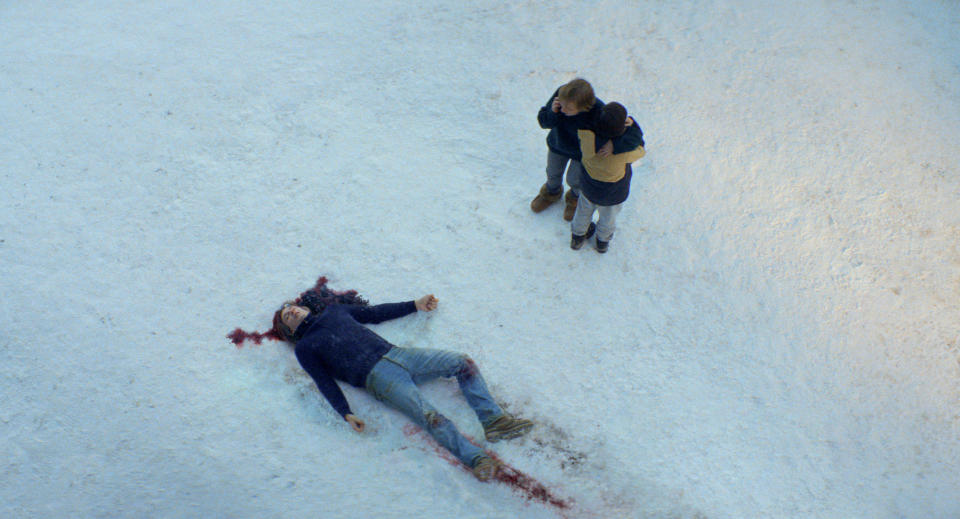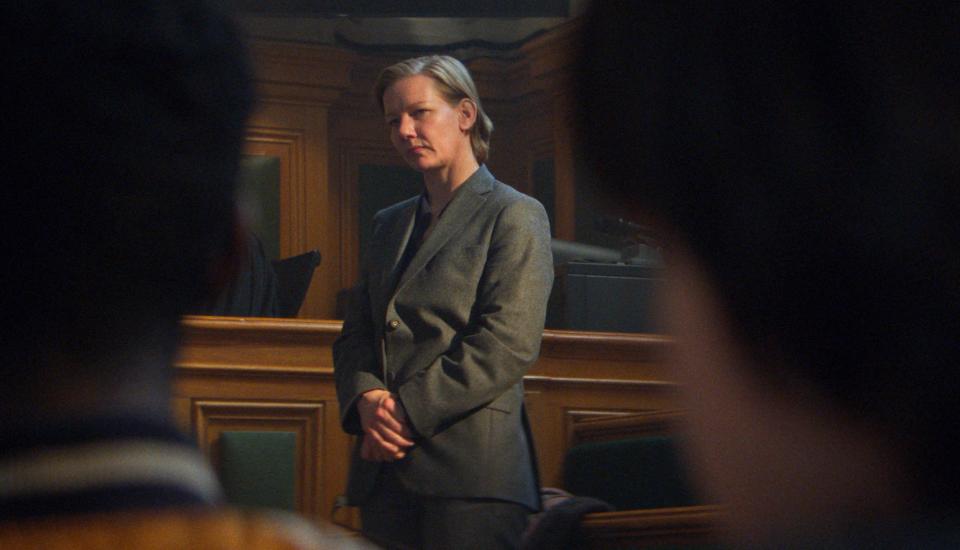‘Anatomy of a Fall’ Refuses to Give Answers — and So Does Filmmaker Justine Triet

French filmmaker Justine Triet‘s intense courtroom whodunit “Anatomy of a Fall,” for which Sandra Hüller could be nominated for Best Actress, doesn’t offer any easy answers. It’s path has also been unexpected: The twisty drama, out now from Neon, was the surprise winner of the Palme d’Or in Cannes. Triet had no idea that her fourth feature, her second Competition entry at Cannes, would take home the Palme d’Or — or that she would be only the third woman to win it.
The film plays well at every screening: the audience leans into the question of whether a German wife, mother, and author (Hüller) pushed her French husband out the window of her mountain chalet attic to his death on the snow below. At the Cannes jury press conference, Brie Larson said the film “created a conversation and a conversation that we loved, and I would hate to put any sort of language to it, because I think it’s worthy, as all films are, to be experienced.”
More from IndieWire
Every year, there are multiple possibilities for France’s submission to the Oscar. The decision is fraught, as the country has not won the gold statue in 30 years, since “Indochine.” It’s not surprising that Triet, after winning the influential Cannes prize, started to hope that the reinvigorated French selection committee (including composer Alexandre Desplat and filmmaker Olivier Assayas) would submit “Anatomy of Fall” for Best International Feature Film.
The film was a huge box office breakout in France, selling over one million admissions. Triet has never experienced such success. “Being so exposed is an incredible thing,” she said in a recent interview with IndieWire. “The scope of the audience that this film has been getting and is going to get is beyond anything that I’ve ever experienced. It’s a big, big hit for now. And for a movie two hours and a half and not a comedy. That’s a source of great joy.”
But the committee selected instead the Juliette Binoche-starring celebration of high cuisine, “The Taste of Things” (IFC Films). Triet’s initial response to her disappointment was to post various protests over the selection on Instagram. She has backed off that stance now. “And now it’s done,” she said. “So it’s the French choice, and I have to accept it. Now I say ‘good luck’ to ‘Taste of Things.'”
“It’s absolutely completely silly that one film would represent one country,” Neon CEO Tom Quinn told IndieWire. “I have to believe that one film should be certified to participate in the overall selection in the international category. But it makes absolutely no sense. This is not ‘Eurovision,’ it’s not one song represents one country.”
The movie started off as an intense writing exercise with Triet’s writing partner and the father of her two children, Arthur Harari, right at the start of the pandemic. “When we started working together,” she said, “we didn’t realize that it would be a three-year affair and that he would be with me all the way to the editing room. I originally asked him to be there for two months and wanting him to stay on.”
They wrote — first talking and debating, then putting scenes down on the computer and emailing new versions for revisions — between babysitting stints. “At the time, we had a nine-month-old and a 10-year-old,” she said. “And so the days were very intense and completely regimented according to this schedule of when the baby slept or napped for three hours in the morning and a few hours in the afternoon. So we had these little hours where we would work very intensely and then rotate the childcare in between them.”

The original story nugget was to “delve into the notion of the couple and the relationship,” she said. “But to do so in a way that was roundabout because the first narrative voice that we have is the voice of others or the tribunal so that Sandra’s character herself is only ever expressing herself in a redacted or corrective way. And so it was to enter her mind, but in this way through the decision of the trial and the exterior eye. In a certain way everyone speaks. She’s dispossessed of her narrative. And she said, ‘OK, it’s my story.’ But she always has to rectify.”
Triet recognizes that the audience is not getting a clear take. “You don’t know, you don’t know,” she said. “Because you are in the same place as Daniel [the couple’s blind son, Milo Machado-Graner] and the jury. You don’t know.”
The movie is split into sequences filmed at the chalet and the play-by-play in the courtroom. “The idea was that there would be only two locations in the film and this bifurcation being this court and the other being the home would grow to become just as judgmental as the trial would be,” she said. “The anxiety and the scrutiny of one will start to seep into the other, especially through the child’s character as he begins to doubt his mother and so that these two sort of islands of scrutiny would form.”
Harari and Triet knew that the film was not going to dazzle moviegoers with a variety of locations and images. “The lack of images was in the center at the beginning of the process,” said Triet. “We were obsessed by [how] we were going to create a movie where there is a lack of images. And it’s the same thing with the blindness of the child, he missed something. We missed something that the jury missed, and we have to understand.”
Was there ever a consideration of a series? The filmmaker planned to make a long movie from the start, “because there are so many movies about cartoons,” she said. “I already have done ‘Victoria,’ which was very short. I was sure what that is. And it was the first time I asked my producer to maybe do a series for TV at the beginning. And they said ‘no, try to make another movie.’ It was in a strange moment in France. Nobody was going to theaters. So I was a little confused about the destination.”

The only way to pull off this feat was to rely on a riveting lead like Hüller. Triet had worked with her on her last film “Sibyl,” in a supporting role as another English-speaking character. “She was in my mind at the beginning,” she said. “Now I was obsessed by her because she was so generous and involved. Even if it was a small part. She had something: she’s not in the seduction process. She’s very natural. And after that, I imagined that character with her in my mind: ‘OK, maybe it could be possible to stay interested by somebody doing for two hours and a half.’ She’s elusive, uncatchable? She’s always different.”
Two days before the first day of shooting the actress demanded that the director tell her if her character was innocent or guilty. “She was all the time, [such] an angel with me,” said Triet. “But it was just one day she was a little worried: ‘OK, I have to know, did she do it or not?'”
“Play it like an innocent,” said Triet, who felt strongly that playing a guilty person would transmit something wrong to the audience. “I didn’t want to close everything and to say ‘OK, you never did anything,’ because if I tell you that it would have concerned the possibility of the danger of the situation. It would be for her very safe. I wanted to keep a place where danger is, to keep the danger alive. Maybe more interesting than her culpability is the way that she as an actress is going to come in and incorporate.”
Triet wanted to avoid obvious tropes. “It’s a cliché role of the accused woman being duplicitous who has a masterful deceit, which is another character function that she could fulfill. It was to stay away from these kinds of manipulations.” Instead, Triet sought “the contradictions that do arise from the ambiguity and ambivalences of experience, and not out of a wicked wink-in-the-eye whodunit?”
So the audience is kept on tenterhooks throughout, pulled by the magnetic Hüller. “She can give very different things one day to the next because she’s very connected to herself,” said Triet. “And then also to her scene partners and to everybody else who surround her in a way that I found rare. The audience can identify with her, and the way that she in the carefreeness that she has when she is being filmed and the acceptance that she has and the trust that she has in me. … She trusts me and I trust her to deliver something that has nothing to do with these kinds of things.”
In the courtroom, Hüller refuses to play “the good victim,” said Triet. “She’s not crying all the time. She’s tough. Her character doesn’t become the good victim for the purpose of the trial. That’s the other way in which she’s not appealing. She remains in her own power in a way that comes to be turned against her, as a threat to the tribunal, or that becomes a trap for her, and it’s because of her mastery of herself with the language.”
There was never a question of the English language percentage of the film being over 50 percent, as Triet had to measure it in order to earn certain financial subsidies. “We had to be sure that French was the main language of the movie,” she said.
Hüller loved working on Triet’s set, she told me. “She has a lot of energy. She is working in a non-hierarchical way. It was a small team, but everybody can have an opinion on something. She would ask people from light what they think about what we should do. It’s really so chaotic in a way, which allows me to make mistakes too. … We both work from a childlike place. She’s not judgmental, she’s absolutely fair. She’s very inspiring with the things that she gives you for work because there are some directors who make the the world of an actor smaller with what they say with things that you already know. Or things that are not interesting at all, so you have to protect the space and you have to make it bigger for yourself but she always adds something that’s really interesting to me and I want to try.”
Next up: Triet is developing two new projects. “One is expensive, one is not expensive,” she said. “I don’t know which will be the next one. Making a film, any film, no matter the budget, no matter the size of the crew, is always a challenging prospect. Knowing how awaited I am on this next work might just make me more scared than I was before.”
Best of IndieWire
Sign up for Indiewire's Newsletter. For the latest news, follow us on Facebook, Twitter, and Instagram.